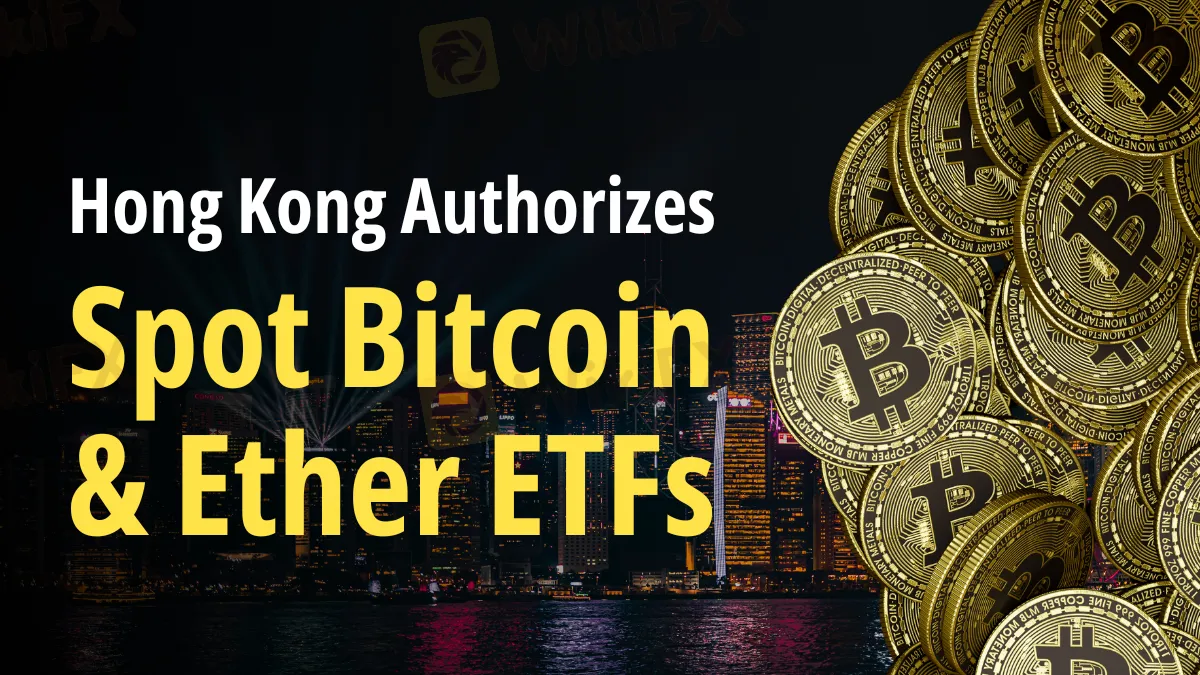简体中文
繁體中文
English
Pусский
日本語
ภาษาไทย
Tiếng Việt
Bahasa Indonesia
Español
हिन्दी
Filippiiniläinen
Français
Deutsch
Português
Türkçe
한국어
العربية
Hong Kong Authorizes Spot Bitcoin & Ether ETFs
Abstract:Hong Kong's Securities and Futures Commission approved three spot Bitcoin and Ethereum ETFs.

On Monday, Hong Kong authorities approved the first Bitcoin and Ether ETFs, expanding cryptocurrency investing prospects in Asia-Pacific. This approach may boost local and regional bitcoin markets.
In the past, the majority of Asian crypto ETFs were futures-based products. With the launch of these spot ETFs, investors now have direct access to Bitcoin and Ethereum via conventional financial methods, which is a significant change. This shift coincides with a 38% increase in the value of Bitcoin after the introduction of comparable funds in the U.S. earlier this year, while analysts warn that larger market variables also play a role in these price swings.
The prices of Ethereum and Bitcoin saw little rise following the news, but these gains quickly leveled out.
Despite current volatility, spot ETFs are likely to attract fresh money to cryptocurrency markets, similar to what occurred in the U.S. when spot Bitcoin ETFs quickly matched broad market fund inflows.
A small but growing share of the $12.7 trillion global ETF market is made up of crypto ETFs, with a market worth of around $85 billion. With $60.6 billion in assets, cryptocurrency-based funds now represent 0.68% of the US ETF market.

Hong Kong's newborn crypto ETF business is valued at $138 million, or 0.3% of the city's ETF market.
If the Hong Kong market expands in line with the U.S. market, analysts predict that it will reach a valuation of around $311 million. The Southbound Stock Connect program allows mainland Chinese investors to purchase shares listed in Hong Kong, and they estimate that there may be up to $25 billion in latent demand from these investors.
The regulatory authorities of Hong Kong did not anticipate approving these funds so fast; that occurred later in the year. Nevertheless, Hong Kong aims to position itself as a frontrunner in the integration of financial trading instruments that are closely associated with cryptocurrencies like Bitcoin by expediting the licensing procedure.
Critics have called these bullish projections “insane,” citing the speculative nature of the market. One such critic is Eric Balchunas, an analyst for Bloomberg Intelligence. Still, the latest regulatory approvals point to a growing recognition of crypto assets in international financial institutions.
Furthermore, this move coincides with the London Stock Exchange getting ready to accept applications for comparable ETFs next month, suggesting a rising trend worldwide toward the acceptance of bitcoin investment products.
Hong Kong-based principal asset managers like China Asset Management and Harvest Fund Management may handle portfolios with more than 10% virtual assets. Offshore Chinese financial institutions are interested in Hong Kong's expanding crypto asset market, which is notable considering mainland China's harsh cryptocurrency trading regulations.

Disclaimer:
The views in this article only represent the author's personal views, and do not constitute investment advice on this platform. This platform does not guarantee the accuracy, completeness and timeliness of the information in the article, and will not be liable for any loss caused by the use of or reliance on the information in the article.
Read more

First Unfair Trading Case Reported Under South Korea’s Virtual Asset User Protection Act
The Financial Services Commission (FSC) of South Korea has disclosed the first case of unfair trading following the enactment of the Virtual Asset User Protection Act. This law, which took effect in July 2024, aims to regulate the cryptocurrency market and protect investors from fraud and market manipulation.

Upbit Faces Severe Penalties for AML and KYC Violations
Upbit, South Korea’s leading cryptocurrency exchange, faces severe penalties for over 700,000 AML and KYC violations.

BSP Pushes for a Cashless Philippines by 2025
The BSP accelerates cashless transactions, aims for a coin-lite society, eliminates small fund transfer fees, and drives financial inclusion by 2025.

Maya Bank Disburses PHP 68B in Loans, Sets 2024 Record
Maya Bank disburses PHP 68B in loans in 2024, advancing financial inclusion with digital banking innovation, BSP compliance, and secure financial solutions.
WikiFX Broker
Latest News
How Long Can the Dollar Remain Strong?
Forex Price Trend Prediction! | Come be a New Year Price Winner!
HFM NY Special Offer!
How a Promised RM1.4 Million Return Turned into a Costly Scam
First Unfair Trading Case Reported Under South Korea’s Virtual Asset User Protection Act
Cinkciarz.pl Under Fire: Frozen Accounts, Missing Funds
“Predict and Win” Big Rewards! Join the Contest Now
South Korean President Yoon Suk Yeol's Arrest Shakes Markets
Titanium Capital LLC Ponzi Scheme: Henry Abdo Admits Fraud, Impacting Over 200 Investors
South Korea's Crypto Regulation Updates for 2025
Currency Calculator






